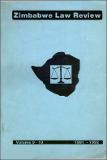| dc.contributor.author | Gwisai, Munyaradzi Dr. | |
| dc.coverage.spatial | Zimbabwe | en |
| dc.date.accessioned | 2015-06-22T08:25:03Z | |
| dc.date.available | 2015-06-22T08:25:03Z | |
| dc.date.issued | 1991 | |
| dc.identifier.citation | Gwisai, M. (1991) Theory and Practice of Liberal Democracy in the Post-Colonial State in Africa: The Zimbabwe Experience, ZLRev. vol. 9-10. (pp. 110-128) UZ, Mt. Pleasant, Harare: Faculty of Law. | en |
| dc.identifier.uri | https://opendocs.ids.ac.uk/opendocs/handle/20.500.12413/6418 | |
| dc.description | A ZLRev article on liberal democracy in Zimbabwe. | en |
| dc.description.abstract | The 1979 Lancaster House Constitution which ushered in Zimbabwe’s independence in 1980 was supposedly based on liberal notions of constitutionalism such as universal and equal suffrage; limited, representative and accountable government; separation of powers of the legislative, executive and judiciary organs of the state; an independent judiciary and a Bill of Rights of the individual and other concepts of constitutionalism. This article is concerned primarily with one key aspect of the concept of constitutionalism, namely liberal democracy and its practice in Zimbabwe in the first decade of independence. | en |
| dc.language.iso | en | en |
| dc.publisher | Faculty of Law, University of Zimbabwe ( UZ.) | en |
| dc.rights.uri | http://creativecommons.org/licenses/by-nc-nd/3.0/ | en |
| dc.subject | Governance | en |
| dc.subject | Politics and Power | en |
| dc.title | Theory and Practice of Liberal Democracy in the Post-Colonial State in Africa: The Zimbabwe Experience | en |
| dc.type | Article | en |
| dc.rights.holder | University of Zimbabwe. | en |


